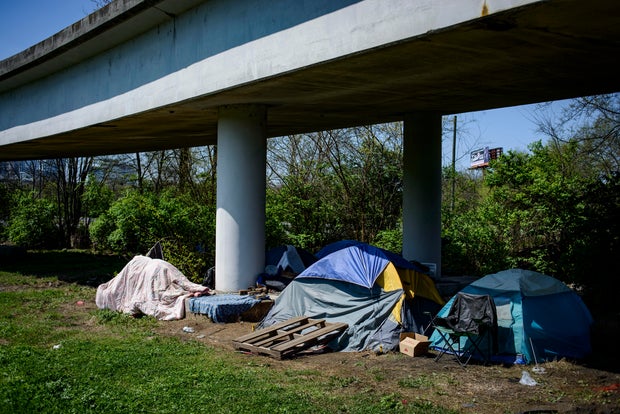Homeless people who camp on public property in Tennessee will face felony penalties if new bill passes
[ad_1]
Tennessee lawmakers are close to sending Republican Gov. Bill Lee a proposal that would threaten felony penalties in opposition to homeless men and women who camp on community general public assets — including in parks — and misdemeanors for tenting about highways.
The Tennessee Senate voted 20-10 Wednesday to advance the bill, with four Republicans becoming a member of Democrats in opposition. The Household currently handed a model of the legislation very last yr. Both equally Republican-dominated chambers need to have to hash out discrepancies in what they permitted.
Opponents have claimed the legislation does nothing to help reduce homelessness, although possibly making it more difficult for homeless folks to rise out of severe poverty if they have a felony on their data.
“When we permit our legislators to turn these who are society’s most overwhelmed down into criminals, we reject the really factor that gives us the right to contact ourselves civilized: our capacity for compassion, for justice rooted in adore for other individuals instead than detest,” Father Charles Strobel, founding director of homeless assist firm Place In The Inn, wrote in a newspaper guest column this 7 days.
The Senate bill’s sponsor, Republican Sen. Paul Bailey, stated it would be still left up to the local authorities regardless of whether to implement the regulation. He argued that the bill does not criminalize homelessness.
The bill provides nearby public property to the present felony penalties that are attainable for camping on condition home, as lengthy as the location is not specified for people to camp there. The felony is punishable by up to six decades in prison. Felony convictions in Tennessee result in the revocation of an individual’s proper to vote.
The penalties for tenting on point out assets were enhanced from a misdemeanor to a Class E felony in 2020, when Republican lawmakers have been responding to right away protests on Capitol grounds contacting for racial justice reform.
Point out legislation broadly defines unlawful tenting as certain pursuits during overnight hours. They contain placing up a tent or furniture, storing personal possessions or food items, cooking, sleeping or setting down a thing to slumber on, and beginning a hearth.
Arrests on nearby community assets would have to be preceded by a warning at least 24 hrs previously. Goods utilized to camp could be confiscated by authorities for 90 times, or for a longer period if they are wanted for evidence in a felony situation.
The bill also introduces a Class C misdemeanor, punishable by a $50 high-quality — which could be waived — and local community service, for camping together highways, including below bridges or overpasses, or inside of an underpass. Violations in all those destinations would not be limited to overnight hrs under the monthly bill. Authorities would need to initial offer a warning for men and women in violation.
The Washington Write-up by way of Getty Visuals
The bill handed by the Property goes even more. It would incorporate soliciting on or near a highway to the new misdemeanor violation.
Bailey, the Senate monthly bill sponsor, reported “tons of church buildings” testified from the monthly bill, but stated he imagined they would have “open up arms” to welcome them in if a rescue mission could not take them.
“I you should not have the respond to for homelessness,” Bailey explained. “Individuals that oppose this legislation, they do not have all the solutions for homelessness. These that guidance this laws, they don’t have all of the responses for homelessness.”
Democratic Sen. Heidi Campbell, who said her Nashville district has a homeless camp that has been remarkably scrutinized, likened the approach to “placing a Band-Help on cancer.”
“I think we have to have to essentially deal with the elementary, root issue with these camps,” Campbell reported.
[ad_2]
Resource website link

